It has been a bleak summer for democratic freedoms in Greece, as dozens of people have been sentenced under dictatorial laws on account of having occupied abandoned buildings and providing housing to refugee families. These are laws imposed in 1938 by Metaxas, admirer of Mussolini and Hitler, and subsequently, during the black seven years of the 1967-1974 military regime.
It all started when the Hellenic Police (ELAS) carried out an extensive operation to evacuate three squats in Thessaloniki, and arrested 74 people who were detained until the following day, while the refugees were transferred to camps without any charges pressed against them. Of the 74 arrested, 15 were convicted, three were acquitted, whereas the trial for the rest has been postponed. Many say that one of the reasons why the police and the government did not press charges against the refugees is that they wanted to obscure the fact that these were squatted buildings housing refugees.
At the same time, defense lawyer Effie Telli wrote that most of the arrested individuals, namely the ones from the Charles Diehl Str. Squat, “were not allowed to use the telephone, neither did they have access to food.”
The first six who were convicted lived in the Victory Avenue squat; the charge is “jointly squatting on public land.” This is based on Law 1539/1938 passed by Metaxas, and replaced by Compulsory Law 263/1968, during the following junta.
The function of these squats was to provide shelter for economic and political refugees, while the needs of the people staying there were met through solidarity networks and local communities. Decisions were taken through direct democracy procedures, involving equally Greeks and immigrants (*).
The evacuation was preceded by a request from the Prosecutor of the First Instance Court, following lawsuits that had been submitted concurrently in previous days by the owners of these buildings against the occupants of each.
The University of Thessaloniki filed a lawsuit for the Victory Avenue squat, the Metropolitan See (Orthodox Church) for the Orphanotrofio (Orphanage) squat, and the landlord for the building on Charles Diehl St., which had remained vacant for five years and was transformed into Hariye Squat on 23/7 by solidarity activists from across Europe (who had been offering voluntary services to refugees in various No Border kitchens throughout the period leading up to the occupation).
With regards to the ruling, five out of six activists received an eleven-month suspended sentence, and the sixth was convicted to a four-month redeemable sentence of five Euros per day), while three out of nine arrestees of this particular case file were acquitted. Among other defense witnesses that testified, AUTH professor Spyros Marketos stated that “never in the past had Aristotle University demanded that the activists evacuate the building.”
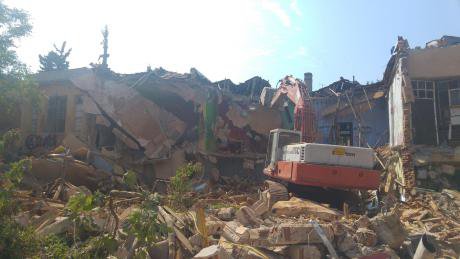
Orphanotrofio. Author's photograph. All rights reserved.Two students who lived in the building claimed that they did so for economic reasons, as unemployment is high and they could not afford to rent an apartment, especially during the years of the implementation of the EU bailout programmes. The accused Grigoris Tsilimantos was the next to take the floor, saying: “The state wanted to respond to the No Border Camp*. Opening our door to the refugees was a given for us. In no way could we have left them at the mercy of the weather.” He wondered with regard to police behavior: “Which code of conduct stipulated that they break doors down with hammers while children are staying upstairs?”
Holy business on the ashes of solidarity
The bulldozers were ready. The evacuation of the Orphanotrofio was immediately followed by demolition.
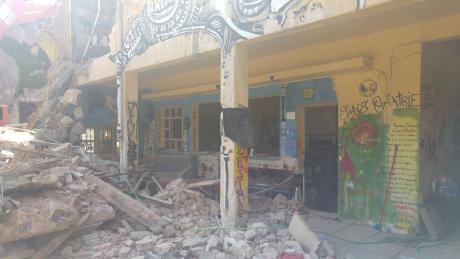
The building was occupied in early December 2015, at which time many refugees who were trapped in Idomeni had been passing through from Thessaloniki. The building housed approximately 400 refugees at different times. Apart from housing, refugees were provided with food and healthcare. The building had originally been an orphanage up until 2000. In 2006 it was occupied by anarchist collectives and was evacuated in 2014 by the right wing Samaras government in an operation reminiscent of the one carried out by the Tsipras government.
One important factor was the ownership of the building and the “exploitation” of the land lot, which prompted many to talk of “holy-business.” In 2011, then-health minister Andreas Loverdos of the PASOK cabinet granted use of the building to the Metropolitan See of Thessaloniki for 50 years (although the Municipality of Thessaloniki also claimed it with a view to converting it into a nursery) in order to run an institution for chronically ill patients.
The use grant took place under certain conditions, most of which were not fulfilled. Specifically, the Metropolitan See was presented with two options, which were either to repair and operate the building within two years, or to demolish it and build anew, which could be operational within five years. Were those conditions not met, the grant would cease to apply.
In mid-2016 the five-year period was drawing to an end for the Metropolis, and so the building was in danger of returning to the hands of the ministry. As squatters had not posed a problem since 2013 and up until a few months previously, the Metropolis had no excuse for not having proceeded to repairing the building. On the contrary, it brought forward a new building construction plan for a total investment of 12 million euros, while calling for changes in building regulations in order to be able to build a new five-story edifice of a total area of 5,500 square meters.
Meanwhile, some of the immigrants of the Orphanotrofio were transferred to a shelter camp which refused to accept them because of full occupancy, and the authorities abandoned them in the middle of the night in the courtyard; eventually, solidarity activists were alerted and drove all the way to the camp and put them up in their houses.
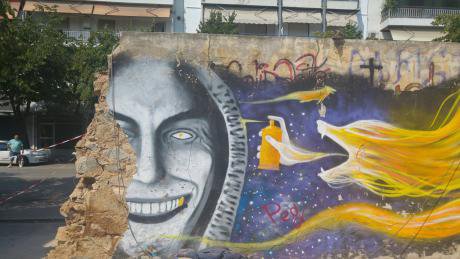
Orphanotrofio. Author's photo. All rights reserved.The destruction of artistic creativity complements the authoritarian setting.
Reactions and new litigations
Immediately after the police operation, demonstrations were held in Thessaloniki, Athens and other cities in Greece and abroad, while SYRIZA party offices in Thessaloniki and Larissa were occupied.
Among other actions, the solidarity movement staged a protest gathering at the Metropolitan Church of Thessaloniki, as a reaction to the Orphanotrofio evacuation. Metropolitan of Thessaloniki, Anthimos, stated: “Such things have never yet happened in Greece. The church is the target and some people will try to knock it down, in the name of the devil. We pray even for our enemies.” The police arrested 26 more people.
Specifically, six were acquitted (among whom was one passer-by), a juvenile’s trial was postponed till October, while the rest were found guilty of civil disobedience because they refused to give their fingerprints and were sentenced to a six-month jail term with a three-year suspension. All, however, were acquitted of the charge of “committing insultingly inappropriate acts inside a church or a place designated for religious gatherings.”
The defendants read a text they jointly wrote, which began, “against the offensive of capital, we reply with solidarity,” and also said that, “what was taking place in the three squats was not charity; on the contrary, we treat immigrants as equal subjects that will be with us in the struggle. The church, on the other hand, threw them out on the street.” They also stated that they had gathered to protest about the evacuation of Orphanotrofio by the Church, but also for the other squats.
The text ended with the phrase “[o]ur solidarity is not dressed in khaki and does not hand out suppressants. Our solidarity is dangerous,” which was greeted with applause.
The defense argued that “[t]hese people could be on holiday at the moment, but instead they chose to hold this demonstration, a cry against the crime being inflicted upon the immigrants” and closed by saying that, “we will be eager to see what words will be chosen in the trial minutes to justify the allegation that the slogan, 'solidarity with immigrants', was insultingly inappropriate.”
The blatant unconstitutionality of the presidential decree, under which the 19 activists were convicted, was also mentioned by Areti Skounaki, board member of Thessaloniki Bar Association. She stated that this was established for the first time in 1972 under the junta and added that, “should one be not caught in the act but arrested later, they are under no obligation to give fingerprints before trial; then how can refusing to get fingerprinted be considered an offense since you have not been convicted.”
SYRIZA and other reactions
The reactions did not prevent Mr. Boutaris and Mr. Kaminis, mayors of Thessaloniki and Athens respectively, from requesting the further evacuation of more occupations, thereby preparing the ground for a new round of repression.
Announcements condemning the repression have been issued by several social and political organizations in Greece and abroad.
“The SYRIZA-ANEL government’s refugee policy is only part of the despicable treatment of refugees by the EU, with fences like those in Evros, stacking them in inhuman conditions in concentration camps, and with the sad result of 3,000 drowned in the Mediterranean,” stated ANTARSYA, also noting that “the government organized the costly crackdown, while at the same time it refuses to secure humane living conditions for the refugees.”
However, a statement was also issued by the Thessaloniki party branch of SYRIZA, condemning the crackdown operation.
All this is of little relevance, as the ruling party has issued similar statements against the government in the past, a fact which did not curb any of the policy options of the government. On the contrary, it has contributed each time to diverting political responsibilities and attributing them to others (the riot police, the respective ministry, etc.). They were never accompanied by resignations or party defections: so such statements are far from dangerous.
Still, the Citizen Protection Minister Mr. Toskas’ statements leave no room for the government to be acquitted of its responsibilities this time. “I certainly back this action; nobody can do what they want to,” said he.
Moreover, he did not hesitate to add that “[t]he Left’s main imperative is not autonomy, but the protection of labor rights, society, democratic rights”.
So many empty houses. So many homeless people. . .
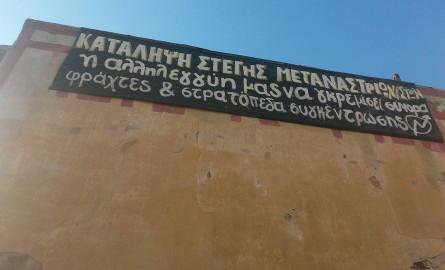
Housing squat for immigrants. Orfanotrofio. Author's photo. All rights reserved.What finally remains of this operation?
Of the three buildings once filled with life and solidarity: at the Orphanotrofio, solidarity now lies buried beneath the debris, while at Victory Avenue and Charles Diehl Street, such possessions that residents could not retrieve remained locked and bolted, slowly collapsing under the watchful eye of fully armed police.
Another two buildings to add to the absurdity of a world where so many homeless people are sleeping on the porch of countless empty buildings. . . The process of criminalizing solidarity was initiated a long time ago by the government itself. The chronicle of a death foretold had already been written: the EU-Turkey agreement, expulsions, the Idomeni evacuation, intense reactions, arrests of solidarity activists, defamatory reports, exhausting identifications of personal data.
Solidarity has died in the three squats. Under government orders. Long live solidarity!
Notes
- 1. In the text, both the refugee and the term immigrant are made use of, since the differentiation is partially imposed by the powers that be so that a section of people can be easily dismissed. Besides, poverty is an equally serious reason for emigrating as war.
- 2. No Border camp is an international camp. In this year it took place in Thessaloniki from 15-24 July in the campus of Aristotle University in Thessaloniki.
- This graffiti poem by Christina Sakali survived the rubble. A reminder that this building was once full of life. English version, Christabel Buchanan.
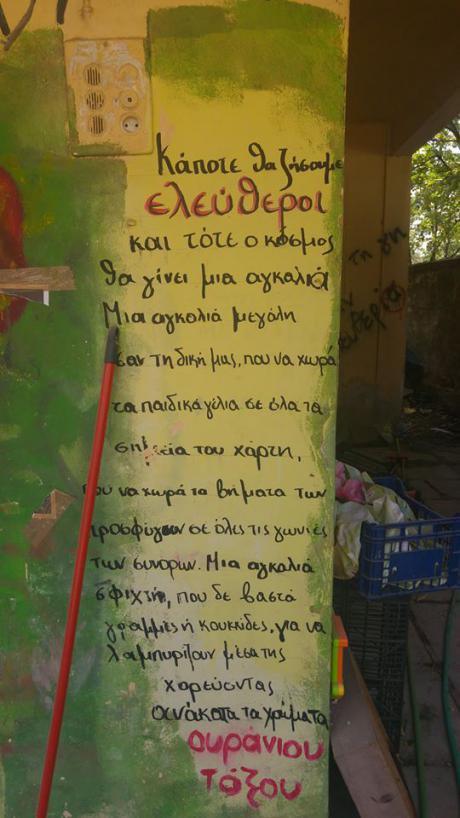
- It says:
- One day we will live free
- and then all the world will become one embrace
- An embrace big like ours
- that can fit the children’s laughter in all the spots of the globe
- that can fit the steps of refugees in all the borders’ corners
- A tight embrace
- that doesn’t hold dots or lines,
- sparkling inside of it
- while dancing
- interwoven, the colours
- Of a rainbow
* Based on Greek reportage from Info-war.gr and newspaper “Prin”
Read more
Get our weekly email
Comments
We encourage anyone to comment, please consult the oD commenting guidelines if you have any questions.